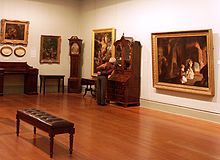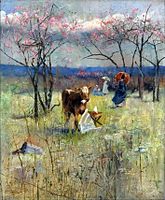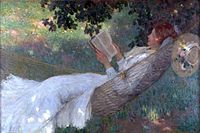37°33′38″S 143°51′30″E / 37.5605°S 143.8583°E / -37.5605; 143.8583
Art gallery in Lydiard Street North. Ballarat, Australia | |
| Established | 1884 |
|---|---|
| Location | 40 Lydiard Street North. Ballarat, Australia |
| Type | Art gallery |
| Website | artgalleryofballarat.com.au |
The Art Gallery of Ballarat is the oldest regional art gallery in Australia. It was established in 1884 as the Ballarat Fine Art Gallery by a company of interested citizens led by James Oddie. It initially rented out the first floor of the Ballarat Academy of Music; the current building on Lydiard Street North opened in 1890. The gallery was privately owned until financial insecurity led to the building and collection being handed over to the Ballarat City Council in 1977. In 2008, the gallery adopted its current name and became a free-entry venue. Louise Tegart is the gallery's current director.
The Art Gallery of Ballarat is a tourist attraction for Ballarat. Listed on the Victorian Heritage Register, its two-storey building is one of the city's most historically significant. The collection is composed of over 11,200 works from the eighteenth century to the present day. The gallery holds temporary exhibitions in addition to its main display rooms on the upper floor. Although the Eureka Flag has been part of the collection since 1895, it is currently on long-term loan to the Eureka Centre.
Establishment
In June 1884, the prominent Ballarat benefactor James Oddie (1824–1911) funded and lent paintings for a public exhibition at the city hall. Soon after, a group of interested citizens held a meeting and decided that a permanent art gallery should be established. Lacking their own building, they rented out the first floor of the Ballarat Academy of Music—where Her Majesty's Theatre now is—from Sir William Clarke. On 11 September 1884, Governor Henry Loch opened the gallery during his first visit to Ballarat. The collection was then mainly composed of loaned items; Oddie was the main benefactor and is considered the gallery's "patron and founder". J. A. Powell succeeded E. Turnbull as Secretary.
In August 1886, the State Government sanctioned £2000 to purchase pictures for the Gallery and granted them a site on Lydiard Street. It was designed by Tappin, Gilbert and Dennehy in the Renaissance Revival architecture style as a bluestone brick and render facade and stone stairway. The foundation stone was laid by Sir William Clarke on 21 June 1887 to commemorate the Golden Jubilee of Queen Victoria. In May 1886, the Ballarat Fine Art Public Gallery Association was established.
The first stage of the new building was completed in 1890. The new building was opened by Alfred Deakin on Friday 13 June 1890.
At the 1905 annual meeting, a heated exchange ensured: gallery president Oddie accused Secretary J. A. Powell of "insubordination in connection" to the gallery's renovation and pawning its items to the government. Oddie threatened to remove all gallery items under his ownership. He only yielded when Prime Minister Deakin urged him in writing to reconsider.
Theft
In the 1970s, the privately managed Ballarat Fine Art Gallery faced financial insecurity. Ron Radford, who served as gallery director from 1973 to 1980, advocated to improve its collection and security. Back then, the gallery employed only Radford, an administrative assistant and a cleaner. In 1978, the gallery was in a large amount of debt; it had begun transferring the building and the collection to the city council the year before. In return, the council covered the gallery's operating costs. Recognizing the security risk, the council had employed two more staff within the year.

In August 1978, an unknown thief walked into the gallery and used a knife to cut the canvas of Tom Roberts' Charcoal burners (1886) from its frame, before rolling it up and walking out. The painting was reportedly worth over $400,000, and the theft received widespread media attention. Gordon Morrison, a later director, described the incident as a "national scandal". According to a member of the Gallery Association Council at the time, Radford received a ransom message several months later and the painting was retrieved from a park in Sydney after it was paid. Charcoal burners was returned to the gallery in May 1979. The incident played an important role in the improvement of security in regional galleries.
Renaming
In 2008, the gallery was renamed the Art Gallery of Ballarat. It also became a free-entry venue and got a new logo.
Architecture

The Art Gallery of Ballarat is located on 40 Lydiard Street North. Listed on the Victorian Heritage Register, the gallery is a double-storey building constructed in the Renaissance Revival architectural style. It features rusticated bluestone pilasters and twin pyramidal pavilions which extend to the ground level. Inside, a large stone stairway with Art Nouveau ceiling decoration leads up to the main gallery rooms.
Designed by the architectural firm Tappin, Gilbert and Dennehy and constructed between 1887–1890, it is the oldest purpose-built art gallery building in Australia. Three extensions were built in the 1927, 1987 and 2001, respectively. A restoration and renovation project in 2009 extended the exhibition hall, relocated the shop and cafe, and restored the facade. The $1.85 million of funding needed was shared by the state government and council. Another restoration took place in 2022.
Collection

Several Australian publications have named the Art Gallery of Ballarat one of the best regional art galleries in Victoria. In November 2022, the collection comprised over 11,200 works. Director Gordon Morrison estimated in 2017 the collection included over two thousand paintings and six thousand prints and drawings. It was the largest regional gallery in Australia until the Gold Coast's HOTA Gallery overtook it when it opened in May 2021.
With a focus on the history of Australian art, the collection spans works from the eighteenth century to the present. It includes colonial and regional art. Items such as Old Ballarat as it was in the summer of 1853-54 (1884), for which the gallery commissioned artist Eugene von Guerard, depict the city's development. The gallery has been acquiring contemporary art since the 1960s. Unusually for a regional gallery, it has been acquiring Indigenous Australian art since the 1930s, particularly from the Northern Territory's Top End, which it includes as part of its contemporary collection.
A journalist for The Argus reviewed the paintings when the gallery opened in 1890. Solomon Joseph Solomon's Ajax and Cassandra (1886) was acquired by the gallery in 1887 after being exhibited at the Royal Academy of Arts and then on tour in Melbourne; The Argus hailed it as a "masterpiece". Although such a piece would typically be obtained by a state gallery, the newly founded Ballarat gallery quickly bought it and it became one of its "most loved paintings". The Argus also spoke favorably of the variety of landscape paintings which Oddie had acquired. Oddie had also contacted the widow of John King, the constable who kept the Eureka Flag after the Eureka Rebellion, to obtain it for the collection. While the flag is still under the gallery's custodianship, it has been loaned to the Museum of Australian Democracy at Eureka and then to the Eureka Centre since 2014.
During the late nineteenth century, the Gallery collection influenced the Lindsay family of artists and writers. In his youth, artist Norman Lindsay would study Ajax and Cassandra—the painting which The Australian credited with Lindsay's "penchant for voluptuous nudes"—and in the 1950s he donated some of his work to the gallery.
-
 Louis Buvelot, One of the Falls of the Wannon, 1872
Louis Buvelot, One of the Falls of the Wannon, 1872
-
 Jane Sutherland, Obstruction, 1887
Jane Sutherland, Obstruction, 1887
-
 Charles Conder, An Early Taste for Literature, 1888
Charles Conder, An Early Taste for Literature, 1888
-
 Arthur Streeton, Autumn (also known as Eaglemont), 1889
Arthur Streeton, Autumn (also known as Eaglemont), 1889
-
 David Davies, Under the Burden and Heat of the Day, 1890
David Davies, Under the Burden and Heat of the Day, 1890
-
 Walter Withers, The Last of Summer (also known as The Rising Storm), 1898
Walter Withers, The Last of Summer (also known as The Rising Storm), 1898
-
 E. Phillips Fox, A Love Story, 1903
E. Phillips Fox, A Love Story, 1903
-
 Rupert Bunny, The Sonata, 1909
Rupert Bunny, The Sonata, 1909
Notes
- ^ Oddie, G. A. (1974). "Oddie, James (1824–1911)". Australian Dictionary of Biography. Vol. 5. Canberra: National Centre of Biography, Australian National University. ISBN 978-0-522-84459-7. ISSN 1833-7538. OCLC 70677943.
- ^ Bate, Weston (1978). Lucky City: The First Generation at Ballarat: 1851–1901. Carlton: Melbourne University Press. pp. 227–228. ISBN 9780522841572.
- ^ Withers, W. B. (1887). The History of Ballarat, From the First Pastoral Settlement to the Present Time (2nd ed.). Ballarat: F. W. Niven and Co. pp. 278–280.
- ^ "FINE ART GALLERY, BALLARAT". Victorian Heritage Database. Retrieved 22 August 2023.
- ^ "BALLARAT PUBLIC FINE ART GALLERY". The Argus. 14 June 1890. p. 11 – via Trove.
- "PRESIDENT V. SECRETARY". The Age. 15 September 1905. p. 6.
- "BALLARAT ART GALLERY". The Argus. 25 September 1905. p. 5.
- ^ Cansdale, Dominic (22 August 2019). "How Wood Splitters art heist from Ballarat helped change regional art galleries forever". ABC Ballarat. Retrieved 22 August 2023.
- Pryor, Sally (12 September 2014). "Retiring NGA director Ron Radford sets Shiva scandal against gallery's positive achievements". The Sydney Morning Herald. Retrieved 25 August 2023.
- ^ Jagodzińska, Katarzyna (2017). "Art Gallery of Ballarat". Art Museums in Australia. Kraków: Jagiellonian University Press. pp. 133–141. ISBN 9788323343363.
- "New name for fine collection". The Courier. 31 August 2008. Retrieved 25 August 2023.
- ^ Pountney, Michelle (30 July 2013). "Cultured country: 10 top art galleries in regional Victoria". Herald Sun. Retrieved 25 August 2023.
- "Ballarat gallery restoration work worth rejoicing over". The Courier. 3 June 2009. Retrieved 22 August 2009.
- McGregor, Maeve (28 June 2022). "Art Gallery of Ballarat to undergo restoration works". The Courier. Retrieved 25 August 2023.
- ^ Flux, Elizabeth (13 December 2019). "Victoria's Best Regional Art Galleries: the Ultimate Road-Trip Hit List for Summer". Broadsheet. Retrieved 25 August 2023.
- Jameson, Julietta (16 July 2021). "Victoria's best regional art galleries: A road-trip from Wodonga to Bendigo to Geelong". The Age. Retrieved 25 August 2023.
- Bianca O'Neill &, Bianca; Swire, Saffron (25 August 2023). "The top regional galleries to visit in Victoria". Time Out. Retrieved 25 August 2023.
- Maier, Adena (15 November 2022). "Art Gallery of Ballarat". Time Out. Retrieved 22 August 2023.
- Young, Bern (7 May 2021). "Australia's largest regional art gallery HOTA to lure culture-conscious travellers to the Gold Coast". ABC News. Retrieved 25 August 2023.
The new $60.5 million gallery overtakes The Art Gallery of Ballarat as the largest in regional Australia
- ^ Watson, Bronwyn (22 December 2012). "An absolute classic". The Australian. Retrieved 25 August 2023.
Further reading
- Beggs-Sunter, Anne (2018). Not For Self But For All: a history of the Art Gallery of Ballarat Association. Art Gallery of Ballarat Association. ISBN 9780648162193.
- Herbert, Harold (4 April 1931). "ART". The Australasian. p. 15 – via Trove.
- Rich, Margaret (2011). "The development of regional galleries". In Griffin, Des; Paroissien, Leon (eds.). Understanding Museums: Australian museums and museology. National Museum of Australia. ISBN 978-1-876944-92-6.
External links
Categories:- Art museums and galleries in Victoria (state)
- Buildings and structures in Ballarat
- Victorian Heritage Register Grampians (region)
- 1884 establishments in Australia
- Art museums and galleries established in 1884
- Tourist attractions in Ballarat
- Golden Jubilee of Queen Victoria
- Renaissance Revival architecture in Australia